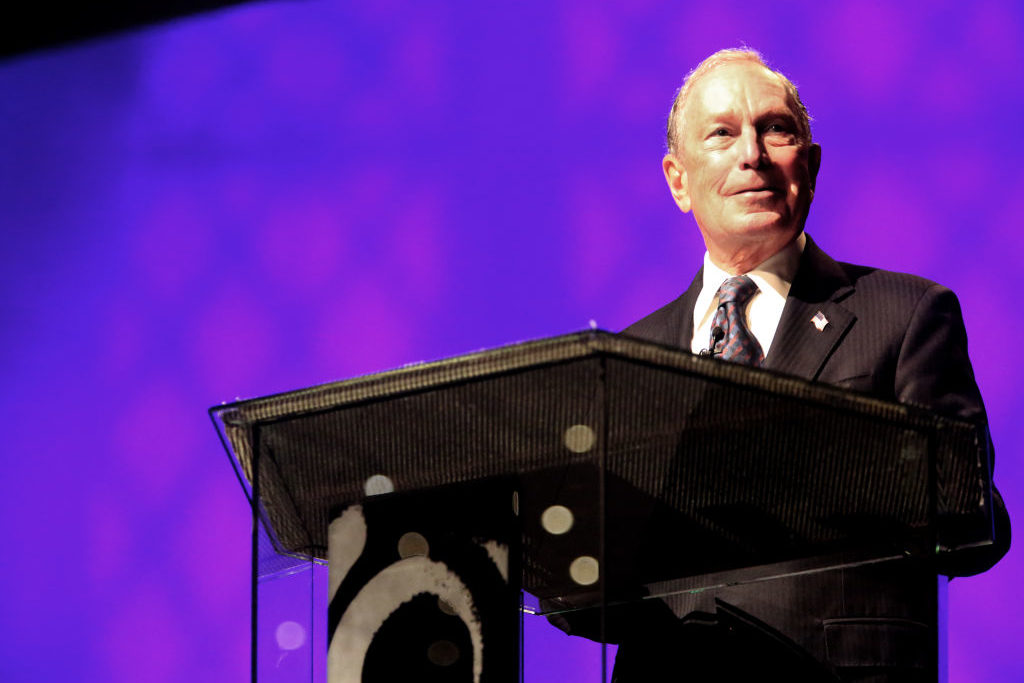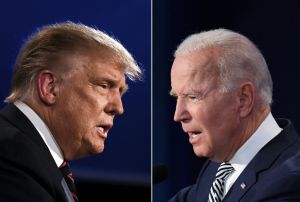This article is in
The Spectator’s December 2019 US edition. Subscribe here.
It’s springtime for billionaires. Former New York mayor and media mogul Michael Bloomberg, who earned fame, among other things, for his abortive crusade against oversized high-calorie sugared drinks, is now joining liberal activist and billionaire Tom Steyer in running for the Democratic presidential nomination. Bloomberg, who turns 78 in February, has filed to enter the primary in Alabama and plans to skip the first four primaries in Iowa, New Hampshire, Nevada and South Carolina.
It may not be sweet home Alabama for Bloomberg, who earned his billions selling private terminals to Wall Street companies looking for real-time financial market data; but he’s banking, as it were, on something else. His candidacy rests on the notion that substantial portions of the Democratic party are yearning for a businessman who can offer an antidote to the socialist elixirs being peddled by Steyer, Bernie Sanders and Elizabeth Warren. In both spirit and aim, their plans are reminiscent of the confiscatory 1909 ‘People’s Budget’, backed by David Lloyd George and Winston Churchill, which accelerated the decline of the British aristocracy. Today, a wealth tax is supposed to crimp the fortunes of the American plutocracy, prompting Washington Post columnist Megan McArdle to warn, ‘No matter how you squint, you cannot make those numbers look small — or fail to notice that enormous economic disruption must inevitably follow.’
Disruption may be what America’s hoi polloi covet, but for the Democratic patriciate a Bloomberg candidacy rests on the idea of a return to normalcy. His foray into the race has already heightened the rifts, or, if you prefer the old Soviet term, internal contradictions, between the Democratic party’s reformers, who want to tweak America’s financial and political system, and the radicals, who want to upend it. Perhaps the lustiest champions of Bloomberg are the NeverTrumpers, the Republican defectors who have been imploring the Democrats to nominate a mainstream candidate to defeat the dreaded Trump. Their view: wealth inequality, wealth inshmuquality. The real target should be Trump, not the wealthy.
The debate was best encapsulated on the New York Times op-ed page where Bloomberg was painted on one day as a redeemer and on another a blackguard. NeverTrump columnist Bret Stephens could hardly contain his glee: ‘The main question is whether Democrats are inclined to allow the former New York City mayor to save them from themselves.’ Charles M. Blow, on the other hand, was aghast: ‘Just the idea of Bloomberg in the race is odious to me. And support for his candidacy incenses me. Anyone who would support Bloomberg is complicit in his terror campaign against… young black and Hispanic men — and dismissive of their pain. If you support Bloomberg, I want nothing to do with you. Nothing!’
Once upon a time America might have raised an eyebrow at the plutocracy seeking high office. During the country’s last Gilded Age, the likes of Cornelius Vanderbilt, James J. Hill, E.H. Harriman, Jay Gould and J.P Morgan suborned politicians, but they didn’t need to run for office. As one of America’s first political bosses, Sen. Simon Cameron, put it: ‘An honest politician is one who, when he is bought, will stay bought.’ Similarly, during the roaring Twenties, business, not politics, came first: in The Great Gatsby, social climbers and the idle rich attend Gatsby’s parties, but no politicians are mentioned.
Since then, however, there has been a mounting preoccupation with the tycoon as politician. Perhaps the shift in popular consciousness was inaugurated by, or at least reflected in, the rise of mass cinema. It’s no accident that Trump has said Citizen Kane is his favorite film. It’s the antithesis of Frank Capra’s lachrymose Mr Smith Goes to Washington, which suggests that a virtuous young politician can stare down the political machine. Like Trump, Charles Foster Kane is the heir to a fortune that he wields as a ruthless club with which to intimidate and bludgeon his competitors and associates into cowering submission. Kane, who is on the verge of becoming governor of New York, doesn’t get taken down by forces for good, but by a seamy machine politician named Jim W. Gettys, who exposes his affair with the ingénue Susan Alexander.
Where does Bloomberg fit in? He isn’t running for private gain, but, like Kane, to sate his authoritarian impulses. Whether it’s the banning of soda pop or the highly intrusive ‘stop and frisk’ policies, he evinces more than a little desire to create his own personal utopia in America. ‘I do think,’ he has said, ‘there are certain times we should infringe on your freedom.’ The libertarian Reason magazine called him a ‘billionaire busybody who can be counted on to oppose individual freedom in almost every area of life’. As president, Bloomberg would command vastly more power and authority than he could wield as a three-time mayor of New York.
There would be a certain rough justice in Bloomberg confronting Trump. In some ways, they are each other’s shadow. Each is imperious and each underwent a political conversion, jettisoning the party they originally joined. The most basic political difference between them is that Trump has managed to pull off the fiction that he represents the working man. Bloomberg, by contrast, is being urged to run by his fellow billionaires like Jeff Bezos, to stave off the insurgents in the Democratic party. Alexandria Ocasio-Cortez, who is campaigning with Sanders in Iowa, remarked, ‘Of course! They’ve got class solidarity. The billionaires are looking out for each other.’
Indeed they are. But in helping to galvanize the left, Bloomberg’s entry into the race may already be boomeranging upon him and his brethren.
This article is in The Spectator’s December 2019 US edition. Subscribe here.




















